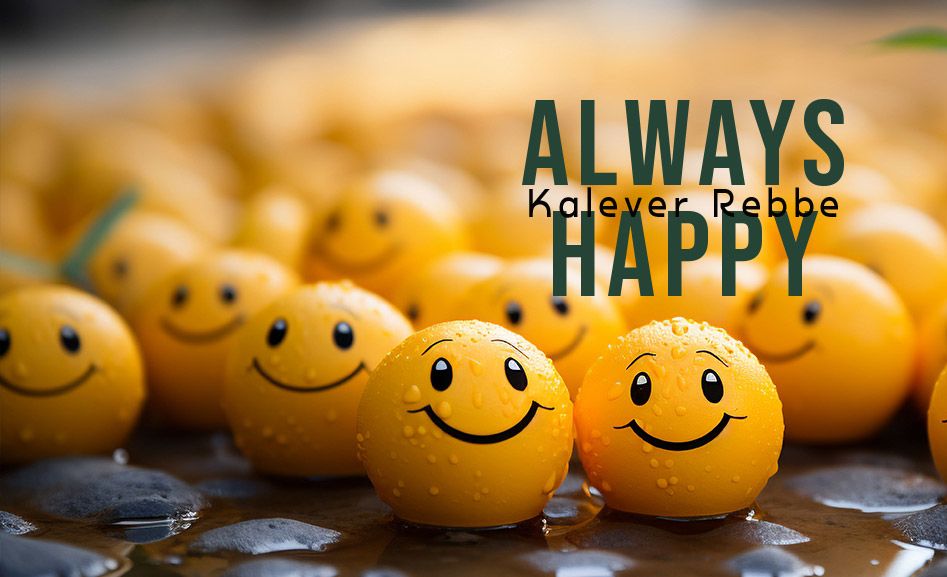
The Past Does Not Exist
Engrave this deeply into your mind and heart - the past does not exist! One should not think about the past at all, and it certainly has no right to affect the future...

Engrave this deeply into your mind and heart – the past does not exist! One should not think about it at all, and it certainly has no right to affect the future.
“Today, if you heed His voice” (Tehillim 95:7). In this life, all a person has is the very day and very hour he finds himself in. Likutey Moharan I:27
Engrave this deeply into your mind and heart – the past does not exist! One should not think about it at all, and it certainly has no right to affect the future. Even a person who has sinned a thousand times, God forbid, shouldn’t think for one moment that his past transgressions have made him too soiled for one more sin to matter. Absolutely not! God forbid! After tens of thousands of sins, a Jew remains a Jew exactly as before, and God’s commandment not to sin still applies to him. If temptation besets him, he must restrain himself as if he never sinned in life. And if a mitzvah presents itself, he should fulfill it as if it were the most natural thing in the world for him to do.
We Don’t Tell a Sinner, Continue to Sin More Stop Doing Mitzvot
In his Mishna Torah, the Rambam writes: “A Kohen who is negligent in fulfilling the commandments, or about whom people are gossiping … is nonetheless allowed to lift his hands [and bless the people]. Because this is a positive obligation upon every priest, and we do not tell a person, ‘Sinner, sin more and don’t do mitzvot’”1
Likewise, in his Iggeres haTshuva, the Rambam offers advice to those who had abandoned their Judaism and are now seeking to return. “I suggest that he try his best to fulfill whatever mitzvot he can. If it happened that he sinned a great deal, or desecrated the Shabbos, let him not move those things that are forbidden to be moved on Shabbos (muktzeh). He should not say, ‘But I’ve already transgressed much greater prohibitions than this.’ Rather, he should be careful with whatever he can.”2
This is an indispensable principle for anyone who wants to come closer to God. The past simply does not exist; it is powerless to affect the future in any way. Even if we have sinned many times, we can still avoid minor transgressions from this moment on. It is forbidden to think, “What good will it do me,” for Chazal have stated the exact opposite, “If you did a multitude of sins, now do a multitude of mitzvot instead.”3
Even Yeravom ben Nevat…
The Vilna Gaon once admonished a heretical Jew who he saw eating a fruit without making a blessing. The heretic said scornfully, “What of it? Don’t you know that I am an apostate?” The Gaon replied, “You are commanded to bless God who created this fruit. In the World to Come, even an apostate will give an accounting on why he did not fulfill at the least mitzvah, such as eruv tavshilin.” The Gaon’s words had a strong effect upon the man, and in a short while he repented completely. Apparently, the words made him realize that he was still a Jew in every respect.4
These are exactly the words of the Rambam in the above letter. “A person must know that the most fundamental principle of our religion is that Yeravom ben Naavat, and others like him, will be held accountable not only for the golden calves that they made, but for their neglect of eruv tavshilin and similar mitzvot. One must not think that greater sins have made one exempt from lesser ones. God holds an individual accountable for both serious and minor transgressions, and rewards every good act. A person should know that he will be punished for every sin he commits, and rewarded for every mitzvah. The matter is not as he supposes.” The Rambam stresses that this contradicts what most of us think.
In a similar vein, the Mishna discusses the case of a Jewish butcher who performs a kosher slaughter, but intends it as an act of idol worship.5 Rabbi Meir says that even such a butcher must cover the blood, in fulfillment of the Torah’s commandment. We see that, according to this opinion, even a Jewish idolater has a mitzvah to cover the blood, just like any God-fearing.
The Past Must Not Destroy the Future
The truth is, our worries over the past are our main impediment to avodat Hashem (our Divine service). As soon as we make up our minds to serve God, the memory of thousands of past mistakes descend on us and try to crush us to the ground, God forbid. But a thousand years of the past have no right to destroy even one short moment of the present, our greatest possession, that waits to be filled with prayer and Torah study. If we honestly want to repair the past then we must take hold of this present moment, and the future as it is coming, and repair what was previously damaged. It has been said, “Don’t pass over a mitzvah.” That is, don’t consider past sins when you have a mitzvah to do in the present.
In Likutey Moharan we read: “When a person breaks the grip of sinful thought, he extracts the portion of holiness that had fallen into the darkness because of his sins.”6 In such a case, not only do we overcome our present desires, we even restore those sparks that had already been lost through our previous actions.
The Mishna states: “Run to perform a mitzvah, and flee from a sin, because the reward of a mitzvah is a mitzvah, and the reward of a sin is a sin.”7 One transgression has the power to lead to another because it draws upon our own potential holiness that has been trapped. But if we repent and overcome our evil inclination the second time around, the original holiness is restored to its place. By fleeing from the sin in the present, we actually regain what was lost in the past.8
Generally speaking, past worries do not disturb us when we are eating, working or shopping. Only when we are studying Torah, examining our lives, and especially when we are praying. Then depression and confusion can literally be overwhelming. Rebbe Nachman pointed out that one word for prayer is tefilah, which is related to the word tahalah-confusion-because during prayer the confusion can be overwhelming.9 The fact that these thoughts become so distracting precisely when we are involved in avodat Hashem is proof that they are only tricks of the evil inclination.
I heard the following humorous story from Rabbi Elya Chaim Rosen.10 A rich nobleman once stopped by a Jewish tavern and got drunk. When he left, he forgot to take his wallet, which contained a rather large sum of cash. This particular innkeeper was in desperate need of money to marry off his daughter. The nobleman disappeared and the Jew didn’t know what to do – should he use the money or not? Perhaps the nobleman would return and demand his loss. But the innkeeper’s clever wife remarked to him, “Don’t worry. Use the money. He’ll never return. He won’t even remember that he lost it. Life rushes by him without a free moment, and each day he forgets what happened the day before. Do you think he had any time for reflection? He never once prays Shemonah Esrei!”
Strategies of the Evil Inclination
In our generation, depression is one of the most successful weapons of the evil inclination, and many people are robbed of their good deeds and yearning for holiness. We must constantly be on guard. Rav Uri of Straslisk wrote: “The Talmud states that in the generation before the Mashiach, chutzpah will increase.11 This means that even a simple Jew, devoid of Torah and good deeds and on the lowest rung of wisdom and fear of Heaven, should nevertheless encourage himself, even with chutzpah, and sing out praises to God. This is actually a great virtue, because perseverance is the main weapon of a Jew.12
Rav Elimelech of Lizensk commented, “First, the evil inclination entices a person to sin. Then, when the individual prays of studies, the evil inclination itself reminds him of what he did wrong and throws him into depression. ‘How can you be so brazen as to pray before the great and awesome God when you know your sinfulness and rebelliousness?’”13 When we pray, we must not think of our misdeeds at all. In the book Maggid Meshorim, the Maggid tells Rabbi Yosef Karo that if any extraneous thoughts enter his mind during prayer, how should burn them by concentrating intensely on the words.
From the Beginning of the Year to the End
When the last few weeks of the yeshiva semester draw near, everyone suddenly comes down with a disease called “end of term fever.” “The semester is over,” one tells oneself. “What can I get out of the few short days that are left?” But such an attitude is wrong; it also comes from thinking too much about the past. When one considers the previous semester, a feeling of hopelessness sets in. “Did I make as much progress as I had planned? Maybe I wasted my time. What about the future? Where will I go next year? Should I transfer to a different yeshiva? Should I stay where I am?” With these types of worries, the evil inclination snatches up all the days and weeks at the end of the semester and really celebrates his victory. (In general, with the first of Adar and the scent of Purim in the air, the Evil One immediately begins distracting people from their studies.)
The truth is, those days at the end of the term are a wonderful time to make progress. One who keeps learning, even on the very last day, shows how precious Torah study is to him, beyond all considerations of time or reward. Rabbi Nachman said that diligence in Torah study is higher than the fulfillment of all the mitzvot.14
If we can forget the past, then each and every moment becomes new in itself. The year is like a circle, completely equal all around, and any point we choose can become the beginning. What does it matter if this is the beginning of the semester or the end? Tremendous amounts of Torah can still be learned, even between terms.
There are sixty days from the first of Adar until the beginning of summer term, two full months; a large part of the year. It’s possible to fill this time with hours of learning. If we do not become distracted, even on the eve of semester break, we will easily defeat the Evil One. Our restlessness is only a scheme to distance us from God. If we pay no attention, we can come amazingly close to the Holy One precisely in the unstructured time between terms.
These Days Also Count
In one of Rebbe Natan’s letters to his son, Yitzchok, he alludes to a terrible plague that was then ravaging his area. Nevertheless, Reb Nosson offers words of encouragement and understanding, words of faith and hope, precisely in those difficult times. At the end of the letter he writes: “’We trust in God, we will not stumble’ (Tehillim 26:1). Grab and eat, my son –even now – Torah and mitzvot, prayer and meditation, whatever you can, because these days also count as part of your life. The verse, ‘Today, if you heed His voice’ (Tehillim 95:7) applies to them as well. If you do so, you and your family will be blessed with a long and full life.” 15
Someone Else’s Worries
There is another complaint commonly heard from young men in their early years of yeshiva: “It’s just not going,” they say. That is, despite all their hard work, they feel no progress and blessing in their efforts.
This is really a great mistake which creates problems in other area of life as well. Our sages have already said: “Four things need constant encouragement: Torah, good deeds, prayer and livelihood.”16 Rashi explains: “If he is a craftsman, he needs support with his craft. a merchant needs support with his sales. A soldier with his battle.” In every area of life we need to find the right type of encouragement to help us continue, even when new problems challenge us daily.
We must remember that whatever we do in life, our only true concern is to fulfill the deed with as much ability and intelligence as God grants us. Because we are creatures, placed by God in a world of action, our only concern is with actions. As for their success, that is God’s business and not that of His creatures. When we worry about the outcome of our endeavors, we are worrying about something that is out of our hands. What business does a creature have meddling in the concerns of the Creator?! As Yoav said: “Be of courage, and let us strengthen ourselves for the sake of our people and for the cities of God, and God will do what is right in His eyes.” (Divrei Yomim 19:13). Certainly we must strive to do the best we can, but at the same time we must remember that deliverance belongs only to God.
One who says, “Since I forget everything I learn, what good does it do me?” is being foolish, for a person receives reward even for the effort. The fool looks for success-how much he remembers-and since that’s not much, he would rather stop. But the wise person realizes that it is a mitzvah to toil at Torah, and that God will certainly not withhold his reward.
There is an old saying: “Who is the person never free of worries? He who worries about things unrelated to him.” Not only does worrying not produce result, it is depressing and leads one to worry about things for no reason at all.
God’s acts and thoughts are inexplicable, yet, this much is certain: He deals with each person according to what he deserves. God alone knows how to repay each person for his deeds. Some see the fruits of their labors immediately; others must wait many years. Even then, the following principle applies: each delay is ultimately for the good. Sometimes God rewards an individual many years later for something done in an earlier place and time. Others see success out of all proportion to their immediate efforts. the Talmud states: “If a person says, ’I toiled and I found,’ believe him,”17 That is, there are times when a person makes a small effort, yet God repays him greatly, which is more of a “find” than a direct reward. Our obligation is only to do good, and let God do what is right in His eyes. He does not withhold reward from any creature.
1 Mishna Torah, Hilchos Tefilah 15:6.
2 In the essay entitled, “The Sanctification of God’s Name.”
3 Vayikra Rabbah 21:4.
4 Even Shlemah, note 85.
5 Chulin 85a.
6 Likutey Moharan I:27.
7 Pirkei Avos 4:2.
8 Ponim Yaffos on Genesis 4:7.
9 Likutey Moharan I:30 on Job 4:18.
10 One of the leaders of the Jerusalem Breslov community (1899-1984).
11 Sotah 49b.
12 Imrei Kodesh, 91. See also Tzidkas HaTzaddik, where Rav Tzaddok HaKohen writes in a similar vein.
13 Imrei Noam, parshas Metzorah.
14 Sefer HaMidos: Limud 33.
15 Alim LiTrufah, letter 34. (English edition: Eternally Yours, Breslov Research Inst.).
16 Brochos 32b.
17 Megillah 6b.







Tell us what you think!
Thank you for your comment!
It will be published after approval by the Editor.